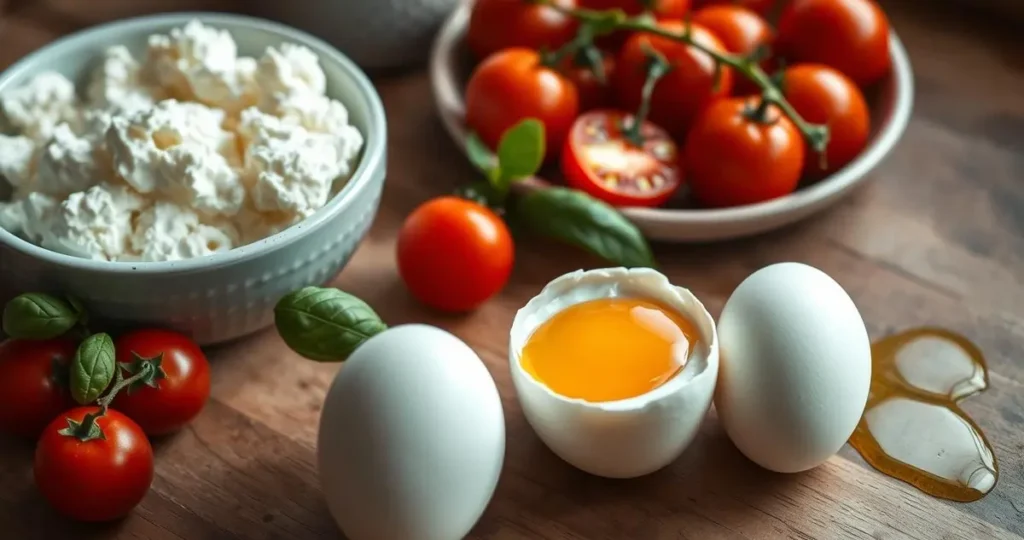Ever found yourself in the kitchen, mixing eggs and cottage cheese, only to end up with watery eggs? Well, you’re not alone in this struggle. In fact, many cooks face this problem. As a result, it can make a simple breakfast turn into a frustrating task, leaving you wishing for that creamy, fluffy texture.
Cottage cheese and eggs can be a great mix if done right. But, their relationship is tricky. Knowing why this dish can be watery is key to getting it just right. With the right ingredients and methods, you can make your egg dish a hit.

Understanding the Texture of Eggs with Cottage Cheese
When you mix eggs with cottage cheese, knowing about egg texture is key. This mix affects the egg’s structure, which is all about science. Eggs have a special protein setup that changes when heated. Understanding this helps you get the right texture in your dishes.
The Science Behind Egg Structure
Eggs have two main parts: the white and the yolk. Both have proteins that change shape when cooked. This change is important for the dish’s texture.
When you heat eggs, the proteins reorganize. This is part of the egg science that helps you control the dish’s texture. The temperature you use can change how these proteins behave. This is important to avoid a watery mess.
How Cottage Cheese Affects Egg Composition
Cottage cheese makes dishes creamy but adds moisture. This can change the egg’s texture in your meal. If you don’t watch the moisture, your dish might be too runny.
Knowing how cottage cheese affects eggs is vital. It helps you make a dish that’s not too wet. Understanding these details makes cooking fun and successful.
Common Causes of Watery Eggs
Knowing why eggs turn watery can make cooking better. For example, the moisture in cottage cheese is key to the dish’s texture. Moreover, different brands have different moisture levels, which can change how eggs mix and cook. In this section, we’ll explore the role of moisture, cooking techniques, and common mistakes to avoid when making scrambled eggs with cottage cheese.
Moisture Content in Cottage Cheese
The moisture in cottage cheese affects egg texture. Drier cottage cheese makes eggs thicker, while wetter ones can make them watery. Always check the label to pick the right one for your recipe. Brands like Daisy and Breakstone’s have different moisture levels.
Cooking Temperatures and Techniques
How you cook eggs is very important. For instance, high heat can cause eggs to separate, making them watery. On the other hand, cooking at lower temperatures helps eggs cook evenly without losing moisture. Therefore, try scrambling or baking at moderate heat for the best results.
Mistakes in Egg Preparation
Some common mistakes can make eggs watery. Over-whipping or mixing cottage cheese wrong can introduce air, making eggs watery. Mix gently but thoroughly to avoid these problems. Watch your cooking times and methods to keep eggs creamy and firm.
| Aspect | Low Moisture Cottage Cheese | High Moisture Cottage Cheese |
|---|---|---|
| Texture | Thicker | Watery |
| Impact on Eggs | Less watery eggs | Watery eggs |
| Recommended Cooking Method | Gentle heat | Moderate heat |
| Common Mistakes | Inconsistent mixing | Over-whipping |
The Importance of Quality Ingredients
Quality ingredients are key to making a tasty dish with eggs and cottage cheese. You should pick cottage cheese that boosts both taste and texture. This makes your meal enjoyable. Fresh eggs are also important for the best results.
Choosing the Right Cottage Cheese
Choosing the right cottage cheese is vital. Look at these factors:
- Fat Content: Pick a fat percentage that you like, as it changes creaminess and texture.
- Curd Size: Smaller curds mix better with eggs, making the mix smoother.
- Brand Reputation: Choose brands known for quality to get a better flavor.
Fresh vs. Older Eggs
Fresh vs older eggs matter a lot in egg dishes. Fresh eggs taste better and feel better in your mouth. Here’s why:
- Flavor: Fresh eggs have a richer taste that makes your dish better.
- Moisture Levels: Older eggs have more moisture, which can make your dish watery.

Tips for Perfectly Blended Eggs and Cottage Cheese
Blending eggs and cottage cheese can make a creamy dish if done right. To achieve the perfect texture, simply follow these tips. Additionally, adjusting your methods can greatly improve your cooking, leading to a more satisfying result.
Straining Cottage Cheese Before Use
Straining cottage cheese before mixing it with eggs is a great tip. It cuts down on moisture, so your eggs won’t get watery. Just use a fine-mesh strainer and let it sit for a few minutes to drain excess liquid.
Adjusting Egg Cooking Method
Choosing the right cooking methods for eggs is key when mixing with cottage cheese. Cook the mix over low heat, stirring slowly. This method blends everything well and controls moisture. Covering the pan helps keep it moist without adding extra water.
| Cooking Method | Moisture Control | Texture Outcome |
|---|---|---|
| Low Heat | Retains moisture without excess | Creamy and cohesive |
| Covering the Pan | Prevents liquid evaporation | Soft and fluffy |
| Straining Cottage Cheese | Reduces excess liquid | Thicker and denser |
Experimenting with Ratios
Finding the perfect mix of eggs and cottage cheese is a fun journey. By adjusting the egg and cottage cheese ratios, you can easily achieve the texture and moisture you desire. Start with some basic guidelines, and then gradually experiment to discover your favorite mix.
Finding the Right Balance
Begin with a classic ratio of two eggs for every cup of cottage cheese. This mix gives a creamy texture and keeps things together. You can tweak this ratio to get different results. For example, a 1:1 mix might be creamier, while a 3:1 mix could make it fluffier.
Proportion Guidelines for Best Results
| Ratio | Texture | Moisture Level |
|---|---|---|
| 2 eggs : 1 cup cottage cheese | Creamy and well-structured | Medium moisture |
| 1 egg : 1 cup cottage cheese | Rich and dense | High moisture |
| 3 eggs : 1 cup cottage cheese | Fluffy and light | Low moisture |
These guidelines are a good starting point for your cooking adventures. Remember, everyone’s taste is different. So, don’t be afraid to play with the ratios to find your perfect dish.
Enhancing Flavor Without Excess Moisture
Making a tasty dish with eggs and cottage cheese is more than just cooking. You can make them taste better by focusing on flavor. This includes adding herbs and spices to cottage cheese and choosing ingredients that go well together.
Adding Herbs and Spices
Herbs and spices can change the taste of eggs without adding too much moisture. Here are some good ones to try:
- Chives – Their mild onion flavor goes well with eggs.
- Thyme – It adds a subtle earthy taste.
- Smoked Paprika – It brings a smoky flavor and depth.
- Dill – It’s refreshing and bright, and it pairs well with cheese.
Just a little bit of these herbs or spices can make eggs taste better. They also add freshness to dishes with cottage cheese.
Choosing Complementary Ingredients
Adding ingredients that go well together can make your egg and cottage cheese dish even better. Here are some great options:
| Ingredient | Flavor Profile | Moisture Contribution |
|---|---|---|
| Spinach | Earthy and slightly sweet | Low |
| Tomatoes | Juicy and tangy | Moderate |
| Feta Cheese | Salty and crumbly | Low |
| Bell Peppers | Sweet and crisp | Low |
Choosing ingredients like feta cheese or bell peppers can enhance both taste and texture. They also help keep moisture levels down.

Overcoming Watery Eggs: Cooking Techniques
To get perfectly cooked eggs with cottage cheese, it’s important to focus on specific cooking methods. By carefully controlling the heat and mixing well, you can not only ensure the eggs remain creamy but also prevent them from becoming too watery.
Using Low Heat for Better Control
Cooking eggs at a lower temperature helps you control the cooking better. This slow cooking makes the eggs creamy, which is great when you mix them with cottage cheese. Here’s a good way to do it:
- Preheat your cooking surface over low to medium-low heat.
- Add butter or oil to ensure even cooking and prevent sticking.
- Introduce the eggs gradually, stirring gently to maintain a stable temperature.
- Monitor the eggs closely as they cook to avoid overcooking.
Mixing Techniques to Minimize Separation
How you mix the eggs can really affect their texture. Here are some tips to mix them well:
- Whisk the eggs thoroughly before adding cottage cheese to create a uniform base.
- Incorporate the cottage cheese gradually while continuously stirring to ensure even distribution.
- Avoid vigorous mixing, which can introduce air and create unwanted separation.
- For a smoother texture, use a food processor or blender when combining ingredients.
| Technique | Description | Benefits |
|---|---|---|
| Low Heat | Cooks eggs gently over a controlled flame. | Prevents overcooking and maintains creaminess. |
| Thorough Whisking | Mixes eggs thoroughly before adding extras. | Creates a more uniform mixture, reducing watery separation. |
| Gradual Addition | Adds ingredients slowly while mixing. | Ensures even integration and prevents clumping. |
Storage Tips for Eggs and Cottage Cheese
Storing eggs and cottage cheese properly is key to maintaining their quality and taste. In addition, understanding how storage affects moisture is crucial. Therefore, here are some helpful tips to keep both eggs and cottage cheese fresh.
How Storage Affects Moisture Levels
Eggs let air and moisture through their shells. Bad storage can make them watery. Cottage cheese also loses moisture, making it too runny. It’s vital to store them well.
Best Practices for Keeping Ingredients Fresh
- Store eggs in their original carton on a middle shelf of the refrigerator to maintain consistent temperature.
- Do not wash eggs before storage as this can remove the protective coating.
- For cottage cheese storage, ensure it is tightly sealed to prevent exposure to air and moisture.
- Keep cottage cheese at a consistent refrigerator temperature to minimize moisture loss and spoilage.
- Use opened cottage cheese within a week for the best flavor and texture.
- Consider freezing cottage cheese if you won’t use it within a few days to preserve freshness.
By following these tips, you can keep your eggs and cottage cheese fresh. This improves their taste and the quality of your meals.
| Ingredient | Storage Tips | Optimal Temperature |
|---|---|---|
| Eggs | Store in original carton, avoid washing | 32°F – 40°F |
| Cottage Cheese | Keep sealed, use within a week | 35°F – 40°F |
Alternatives to Cottage Cheese
If cottage cheese doesn’t appeal to you, don’t worry—there are plenty of other creamy options for eggs. In fact, these alternatives offer a variety of tastes, textures, and health benefits. Moreover, they’re perfect for those looking to mix things up in their diet.
Substitutes for Creaminess
Here are some creamy alternatives:
- Ricotta Cheese: Sweeter and creamier than cottage cheese, it’s perfect for eggs.
- Greek Yogurt: Its thick texture adds a tangy flavor and boosts protein.
- Crème Fraîche: Rich and tangy, it makes eggs creamy and delicious.
- Mascarpone: This Italian cream cheese adds luxury, but it’s higher in fat.
Nutritional Comparisons of Other Cheeses
It’s good to know how different cheeses compare nutritionally:
| Type of Cheese | Calories (per 100g) | Protein (g) | Fat (g) |
|---|---|---|---|
| Cottage Cheese | 98 | 11 | 4.3 |
| Ricotta Cheese | 174 | 7.5 | 13.5 |
| Greek Yogurt | 59 | 10 | 0.4 |
| Crème Fraîche | 340 | 2.5 | 34 |
These comparisons show you the variety of cheeses available. You can pick based on your diet and enjoy tasty, creamy dishes.
When to Seek Help from Professionals
Creating the perfect egg and cottage cheese dish can be tough. However, if you keep getting watery eggs, it might be time to ask for help. In fact, talking to culinary experts can provide you with valuable insights and new skills to improve your cooking.
Consulting with Culinary Experts
Culinary experts have a lot of knowledge to share. They can help you through personal talks or cooking classes. Their advice can make your cooking better and more fun.
Finding Reliable Cooking Resources
Using good cooking resources can also boost your skills. Look for cookbooks, online tutorials, and cooking shows about eggs and cottage cheese. Tips from culinary schools or famous chefs can make a big difference. With reliable info, you can try new things and get better at cooking.
FAQ
Why are my eggs watery when I add cottage cheese?
Watery eggs can happen because of cottage cheese’s moisture. Different brands have different water levels. This can change your dish’s texture.
Also, cooking at high heat can cause egg parts to separate. This leads to a watery consistency.
How can I avoid watery eggs when using cottage cheese?
To avoid watery eggs, strain the cottage cheese first. This reduces its moisture. Use lower heat when cooking to keep the eggs creamy.
What types of cottage cheese should I use in my egg recipes?
Choose cottage cheese with less moisture and a thicker texture. Full-fat cottage cheese is great for creamy dishes. Fresh cottage cheese tastes better and has a better texture.
Can cooking temperature affect the final texture of eggs with cottage cheese?
Yes, it does! High heat can cook eggs too fast, making them watery. Use low to medium heat for a fluffy, creamy texture.
What are some effective mixing techniques to minimize watery eggs?
Mix gently to avoid watery eggs. Fold the cottage cheese into the eggs instead of beating them. This prevents too much air and keeps the eggs creamy.
How does the freshness of eggs influence the dish’s outcome?
Fresh eggs make a big difference. They hold their shape better and add creaminess. Older eggs can make your dish watery and less flavorful.
What are some flavorful additions to enhance my egg and cottage cheese dishes without adding moisture?
Add herbs, spices, or cheese to boost flavor without extra moisture. Dried herbs like oregano or fresh chives work well.
Are there alternatives to cottage cheese in egg dishes?
Yes, try ricotta cheese, Greek yogurt, or cream cheese if cottage cheese makes eggs watery. They offer creamy textures and different flavors.
How should I store eggs and cottage cheese to maintain quality?
Store eggs and cottage cheese properly. Keep eggs in the fridge and cottage cheese sealed tight. This prevents moisture and keeps them fresh.
When should I seek professional help for cooking advice?
If you always get watery eggs, get help from cooking experts. They can give you tips and techniques to improve your cooking.
Conclusion: Achieving the Perfect Egg and Cottage Cheese Dish
Creating the perfect egg and cottage cheese dish is all about understanding texture and flavor. It’s key to know how moisture in cottage cheese affects eggs. Also, fine-tuning your cooking skills is important.
Quality ingredients are the heart of a great dish. Choose fresh eggs and top-notch cottage cheese. Also, try straining cottage cheese before blending to change the texture.
Recap of Best Practices
As you cook, remember to use low heat for better control. Also, use mixing techniques to avoid egg separation. These tips are just the start of exploring flavors and textures.
Try adding herbs or different cheeses to find your favorite mix. The possibilities are endless in making the perfect dish.
Encouragement to Experiment at Home
Don’t be afraid to try new things in your kitchen! In fact, let your creativity shine by mixing ingredients and flavors you enjoy. After all, your kitchen is a great place to discover and perfect your own special egg and cottage cheese recipe.
Every time you try, you get closer to mastering this tasty dish. So, have fun while you’re at it!
Related Recipes to Perfect Your Egg and Cottage Cheese Dishes
Struggling with watery eggs or curious about how to elevate your scrambled eggs? Dive into these related recipes for tips and ideas to make your breakfast truly special:
- What Can I Add to Scrambled Eggs to Make Them Better?
Discover creative add-ins like herbs, cheeses, and spices that can transform your scrambled eggs into a flavorful delight. - Scrambled Eggs and Cottage Cheese: A Healthy Combo?
Learn why cottage cheese and scrambled eggs make a healthy, protein-packed breakfast option and how to balance flavors. - Is Cottage Cheese Good in Scrambled Eggs? Find Out Now!
Explore the benefits of adding cottage cheese to scrambled eggs and tips for achieving the perfect texture.

